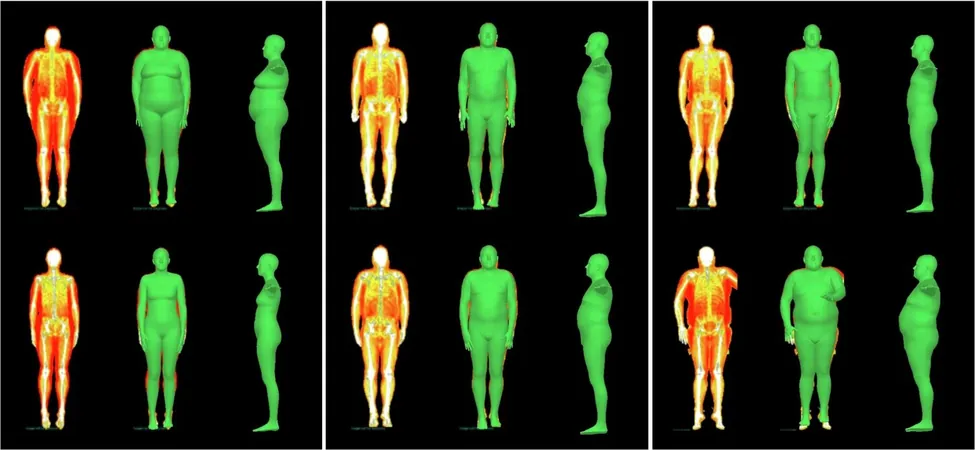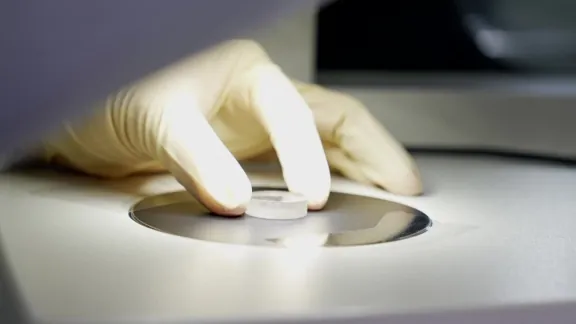
Revolutionary AI App Creates 3D Human Models to Measure Body Fat—Promising Health Insights!
2025-03-24
Author: Mei
In a groundbreaking advancement, researchers at the University of Cambridge have unveiled an innovative smartphone application called 3D BodyShape, designed to utilize machine learning for the accurate assessment of body composition. This revolutionary app could potentially empower users to understand their health risks better, particularly risks linked to heart disease and stroke, simply by taking a few photographs.
The core technology behind 3D BodyShape leverages a sophisticated machine-learning algorithm trained on extensive medical imaging data sourced from over 12,000 adults. By capturing just four images from different angles—front, back, left, and right—the app successfully constructs a detailed three-dimensional model of the human body, thereby providing insights into how fat and muscle are distributed across the body. Remarkably, this analysis is performed entirely on the smartphone, ensuring privacy and security as no data or images are shared.
The findings of this remarkable project have been documented in the esteemed journal npj Digital Medicine, highlighting the urgent need for accessible health monitoring tools amidst escalating concerns over poor metabolic health globally. Cardiovascular diseases are now the leading cause of death worldwide, with a staggering one-third of adults grappling with conditions linked to obesity and metabolic issues.
“Body composition is a strong predictor of various health conditions, including diabetes and heart disease. Individuals with an 'apple-shaped' body are particularly vulnerable,” explained Professor Roberto Cipolla, the research lead. He emphasized that while genetics plays a role in health, many lifestyle-related diseases can be mitigated through informed choices—a message this app aims to promote.
Traditionally, body mass index (BMI) has been used to gauge obesity, but it fails to differentiate between fat and muscle, making it a less effective health indicator. As Dr. Emanuella De Lucia Rolfe stated, while clinical settings utilize accurate measurement methods, they are often expensive and limited to specialized facilities. The development of 3D BodyShape holds the promise to democratize health insights, providing invaluable data straight to users' smartphones at no cost.
Training for the app involved more than 20,000 DXA (dual-energy X-ray absorptiometry) scans from participants of the Fenland Study, who provided critical data on body composition, lifestyle factors, and other health metrics. Converting these scans into three-dimensional avatars established a strong foundation for understanding body shape variations within populations.
However, the current research sample primarily consisted of White Europeans, prompting the researchers' intention to explore the app’s applicability across various ethnicities and age groups in future studies. “Understanding how body fat distribution varies by demographic factors is crucial for enhancing the app's accuracy,” noted De Lucia Rolfe.
The potential benefits of 3D BodyShape extend beyond individual health management—it also aims to reduce unnecessary doctor visits by providing users with tangible indicators of fitness and body fat. Dr. Soren Brage highlighted the hope that such tools could motivate individuals to adopt healthier lifestyles, ultimately saving lives and healthcare costs.
In summary, the 3D BodyShape app emerges as an exciting tool in personal health monitoring, allowing individuals to gain a deeper understanding of their body composition and associated health risks. As artificial intelligence continues to evolve, the possibility of empowering individuals with actionable health data is not just a dream; it is now becoming a reality that could transform how we approach personal and public health. Stay tuned, as this innovative application could redefine your understanding of wellness!




 Brasil (PT)
Brasil (PT)
 Canada (EN)
Canada (EN)
 Chile (ES)
Chile (ES)
 Česko (CS)
Česko (CS)
 대한민국 (KO)
대한민국 (KO)
 España (ES)
España (ES)
 France (FR)
France (FR)
 Hong Kong (EN)
Hong Kong (EN)
 Italia (IT)
Italia (IT)
 日本 (JA)
日本 (JA)
 Magyarország (HU)
Magyarország (HU)
 Norge (NO)
Norge (NO)
 Polska (PL)
Polska (PL)
 Schweiz (DE)
Schweiz (DE)
 Singapore (EN)
Singapore (EN)
 Sverige (SV)
Sverige (SV)
 Suomi (FI)
Suomi (FI)
 Türkiye (TR)
Türkiye (TR)
 الإمارات العربية المتحدة (AR)
الإمارات العربية المتحدة (AR)